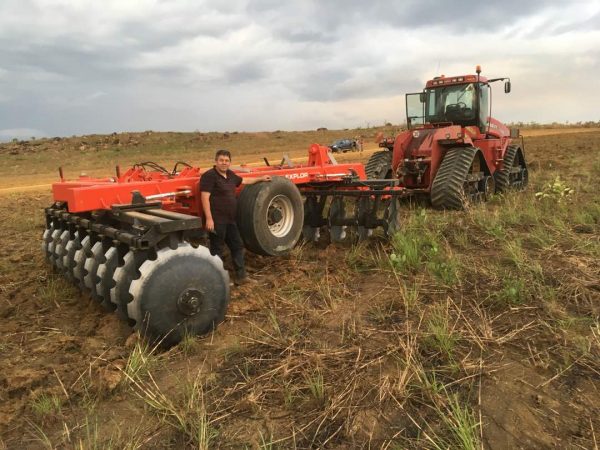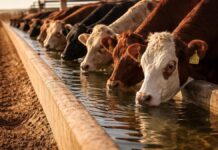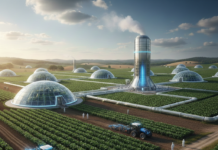How Africa can become the breadbasket of the world.
Of course, it is not possible to make sweeping judgements about Africa, both in terms of its tertiary extension and its cultural differences, this make it difficult to find individual causes for the current situation. Surely someone from East Africa will say that the situation I have described does not apply to him and someone from West Africa will say that it is quite different for him. But one thing most countries in Sub Saharan Africa have in common, they are not self-sufficient in food and up to 95% of the processed food as pasta or canned food that has to be imported. All this despite the fact that Africa has the greatest potential for future agricultural land, with only 3% of it being used for agricultural purposes.
The hard truth is:
I learned in my first semester of agricultural economics that an economy can only develop in a stable way if the agricultural sector is functioning and the supply of the population from their own resources is ensured. Only then is a country stable enough for sustained foreign investment and capacity for its own development is released. The leading industrial nations are always in the position to supply themselves and to gain profits from the surplus through export. Germany is a small country; it is the 4 largest industrial nation in the world. Africa is 86 times larger than Germany and if you calculate the actual agricultural area, the ratio is 1 to 100. Only 30% of the area in Germany is used for agriculture, the population density is higher than in China. The German agricultural industry has exported agricultural products worth 70 billion € last year.
African agriculture is often very one-sided:
If you only have a really marketable product like cocoa or rubber you are extremely dependent on the international market. When you have only one product for the market, the risk of losing everything is extremely high. This not only in agriculture.
Competitive disadvantages of African agriculture:
There is a competitive disadvantage for my African colleague caused by the African countries. If I want to buy a tractor in Germany today, it is 30% cheaper than in Africa. Then I can finance this tractor for 0.5-1.5% interest. If I should not have enough securities for a project, a state guarantee bank helps me to secure my financing. Why is this not possible in Africa. Because of mismanagement and corruption and a missing and chaotic support system nobody believes in these countries. The farmers of Africa have to suffer.
What is needed:
Previous programs have always covered only one aspect of a farmer and therefore could only fail! There are 3 areas that interfere with sustainable development.
1. Is the state framework
2. Professional agricultural frames
3.Financial framework
1. Agriculture needs clear ownership, secure tax and customs regulations and financial support in the form of an agricultural guarantee bank. It would be important to have a young farmer program that provides each graduate of an agricultural education with a farm with buildings and machines. Not as a gift but as a long-term financing over 40 years. This program has managed to give 100,000 farmers in Germany new farms after the Second World War.
2. Being a farmer has something to do with mentality. That means to pursue a long-term strategy that can be followed over several generations. My family has been farming without interruption for 400 years. This is the main reason for success besides a good education. This can only be achieved through role models.
3.With a state guarantee of €100 million provided by a state guarantee bank, investments of up to €1 billion can be triggered. Farmers who cannot provide collateral for the purchase of a tractor, for example, can get a guarantee for financing from John Deere, for example. For this additional security Importer has to pay.
Training alone does nothing:
During the communist era, Russia had the best trained agricultural specialists, but was unable to feed its population. Then the political framework and structure changed and Russia became the world’s wheat exporter. If the conditions for farmers are not to change, nothing will change. Russia has decided to expand the agricultural area by another 17 million hectares, which is as much as Germany’s agricultural area
New agricultural areas are necessary:
Official figures say that only about 3% of the possible agricultural land in Africa is really used. This number is hard to follow, but is that if Afrika want to provide food to myself, the agriculture areas must expand.
But here there is a lot to consider in order not to create a social and ecologic disaster here.
In order to build new farms, it is important to see if there is already agricultural production there. Even if this is very small, such an area is not suitable for a new farm. In many countries in Africa, the government do not take any account of this and give the land especially to foreign investors. But also, in regions in which there are hardly any agricultural traditions, many points to note. Sufficient distance from villages, respect for wood collecting areas, respect for hunting grounds and absolute respect to religious places.
A conversion of natural land into arable land also has ecological consequences. In addition to respecting the breeding grounds of birds and other habitats for animals. It is important to maintain a particularly distance to rivers, as it cannot exclude that pesticides and fertilizers directly go in streams and rivers. That small rivers be used in Africa often as a bathing area as well drinking water place. You could say now, what does he say that is all normal standards, but you can see all these negative examples around the world.
The necessary expansion of agricultural land in Africa will have considerable ecological as well as social consequences. Since land ownership always involves a certain amount of power, it must be considered how it should be here. As the situation in India or Brazil shows, there is a danger here the same mistakes are made in Africa. These points have Africans to decide for themselves.
It must be clear to all those involved that any action here will bring change not only in Africa.
The bottom line is:
Currently, in most African countries there is no consistent and long-term strategy for the development of sustainable agriculture.
In addition, NGOs often start very short-term aid programs with questionable goals that have been largely unsuccessful in the last 50 years. goals are also often wrongly formulated, claiming that organic agriculture could be a way for Africa, but Africa has neither the climatic conditions nor the market for such products. To name just one example of a mistaken development.
Nobody needs Africa to feed the world, only the EU together with Russia would be able to feed the African population. But for a sustainable economic development in Africa the key lies in agriculture. Governments that depend on food imports cannot have independent economic policies because these governments are always open to blackmail. Many political programs talk about supporting small farmers.
From an economic point of view, this is a waste of resources and money. Small farmers will never be able to compete with highly efficient farms in Europe and the USA. Holland a country 7 times smaller than Germany and world champion in agricultural exports.
In Germany only 2% of the population works in the agricultural and food sector. Africa should focus on creating efficient family farms. In the history of Germany, there have been several programmes to create sustainable farms. One was after World War II, when 100,000 farmers needed a new farm after being evicted from their farms in Eastern Europe as a result of the war. Here standard farms were built and handed over to the farmers.
These farms had a dwelling house, a stable and a barn and basic equipment of machines. This way whole villages with high efficiency farms were created. After the reunification of Germany, a program of privatization of agriculture was implemented in East Germany with the same goals, namely to create sustainable agriculture. All of these programs were carried out by the Agricultural Pension Bank and the state real estate society.
Autor : Rainer Tögel








